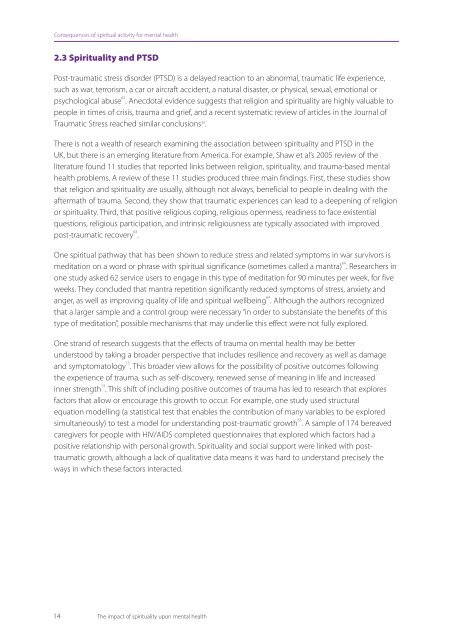The Gift of Spirituality
The Gift of Spirituality
The Gift of Spirituality
Create successful ePaper yourself
Turn your PDF publications into a flip-book with our unique Google optimized e-Paper software.
Consequences <strong>of</strong> spiritual activity for mental health<br />
For those who find meaning or purpose in life through religion or spirituality, church attendance is<br />
<strong>of</strong>ten (although not always) associated with lower levels <strong>of</strong> depression and this is true for both adults,<br />
children and young people 44 . One way <strong>of</strong> understanding this effect is the possibility that some faith<br />
communities promote social inclusion (either passively or actively), which affects both incidence <strong>of</strong><br />
and coping with depression. This possible mechanism will be examined in more depth in section 3.<br />
Similarly, most <strong>of</strong> the research shows that people involved in religions that encourage internalisation <strong>of</strong><br />
a set <strong>of</strong> values are at substantially reduced risk <strong>of</strong> depression, compared to those who attend a church<br />
because <strong>of</strong> obligation or duty 22;45 . One study found that for every 10-point increase in a person’s intrinsic<br />
religiosity, there was a 70% increase in recovery from depressive symptoms after physical illness 46 .<br />
Similar findings have been found amongst those who believe in a transcendent being or higher<br />
power 47-49 and amongst those who belong to a community with others who share their values and <strong>of</strong>fer<br />
support 50 .<br />
In short, the overall conclusion drawn by much <strong>of</strong> the research is that many expressions and elements<br />
<strong>of</strong> spirituality are helpful in reducing depressive symptoms and/or increasing general wellbeing 1;51 . <strong>The</strong><br />
mechanisms through which these effects may occur are discussed in Section 3.<br />
2.2 <strong>Spirituality</strong> and anxiety<br />
Similar research has examined the relationship between spirituality and anxiety or stress. <strong>The</strong> symptoms<br />
commonly associated with anxiety can be emotional, intellectual, physical and/or social. <strong>The</strong>se include<br />
feelings <strong>of</strong> shame, grief or aloneness; difficulty concentrating or an inability to learn new details;<br />
increased breathing and pulse rate, difficulty sleeping and problems with eating; social apprehension,<br />
isolation or withdrawal and irritability or unusual levels <strong>of</strong> aggression. In addition, Swinton argues that<br />
stress and anxiety can have spiritual symptoms, including:<br />
•<br />
•<br />
•<br />
•<br />
•<br />
•<br />
•<br />
•<br />
a loss <strong>of</strong> meaning in life<br />
obsessional religious thoughts and actions<br />
feelings <strong>of</strong> alienation and indifference<br />
loss <strong>of</strong> previous spiritual belief<br />
no sense <strong>of</strong> the future<br />
fear <strong>of</strong> death<br />
fear <strong>of</strong> the consequences <strong>of</strong> ‘sins’ or religiously-defined ‘bad’ behaviour and/or<br />
an inability to focus on ‘God’ or to meditate 8<br />
12<br />
<strong>The</strong> impact <strong>of</strong> spirituality upon mental health

















